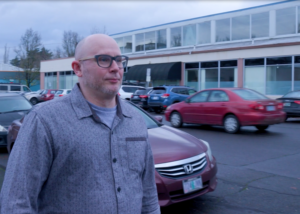February 17, 2022
Dispatches From Peer Providers: Peer Support is Truly Person-Centered
By Clay Robbins, Program Supervisor for Peer Services at Project Respond
When I was asked to write about how peer support is person-centered, I thought this would be an easy topic. After all, I hear the phrase often. So often, in fact, that I do not usually stop to consider its true meaning and implications. When I do think about this, I realize that being person-centered is really what peer support is all about. The most basic tenets of peer support all revolve around this concept. This begins with respecting our peer clients’ autonomy, letting them decide what we talk about, what we do, and whether we even meet at all. (Peer support is always voluntary.)
Then, we listen. We don’t listen in order to check boxes on an assessment or checklist, but rather to let our peer participants feel truly heard and to support them building a narrative that can lead to hope. I like to tell my peer clients, “You are the expert on you.” No matter what their current struggles are, there are answers to be found within.
I remember in my early recovery, when I had just come to realize the impact of my mental health and substance use challenges on my life, I started looking for support, but nothing seemed to fit. Being homeless made it hard for me to make it to counseling or take medication consistently. I found a treatment program that helped with my opioid use but didn’t address my meth use. There were shelter options available, but none where my husband and I could stay together. It just seemed that all the supports were made for someone else. Looking back, none of these services were person-centered, and that is what I needed most.
Advocacy is another step where peer providers are person-centered. Most systems fail to account for the details of an individual’s life, seeing them as a diagnosis to be treated or only through the lens of their challenges. As peers, we advocate for the whole person to be seen and considered. Each individual has their own unique priorities that are based on a lifetime of experiences, and as peer providers we support people in identifying what those are and making a plan to achieve them.
By treating everyone as unique, not just as a diagnosis or set of symptoms, we can help people truly be seen and heard. I have found that when people work toward something positive, as opposed to focusing on moving away from something negative, they are much more likely to succeed. One of the keys to my recovery was assessing my values and envisioning a life that had meaning for me. I didn’t make changes in my life because I wanted to stop doing things; I made changes because I wanted to live a better life, and those behaviors just weren’t compatible.
Language matters, and peer specialists strive to use person-centered language to demonstrate respect for our participants. This goes beyond just saying “a person with” before a diagnosis. It is about recognizing that we are not our diagnoses, we are not our trauma, and that we can change. By talking to and about our participants as people, as unique individuals, we help dismantle stigma, marginalization, and discrimination. As peer providers we set an example for our peers and colleagues by choosing language that encourages people to see each other as human.
Part of the reason I choose to do the work I do today is because I encountered folx on my recovery journey who truly listened and helped me find my path to wellness. It is an amazing and humbling opportunity to be able to support others in the same way.
See Clay in action as a peer provider in the video below.
Interested in a career that supports our community? Join our team!
You can learn more about becoming a Peer Wellness Specialist here.

